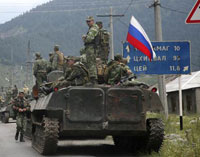Georgia seeks ‘limited war’ to draw international attention
Pravda.Ru has interviewed several experts on the problem of the conflict between Georgia and South Ossetia. The following are the most interesting comments:

Emmanuel Karagiannis
Lecturer at University of Macedonia, Thessaloniki, Greece (specializing in the Caucasus region)
“Georgia’s military campaign in South Ossetia aims primarily at solidifying domestic support for the Saakashvili government, while drawing international attention to the country’s ethnic conflicts. Tbilisi knows very well that the violent reoccupation of the breakaway region is not a realistic option, bearing in mind that the majority of the population holds Russian passports.
Therefore, the Georgian government is seeking a limited war that could possibly lead to new negotiations between Tbilisi and Tskhinvali. Moreover, Tbilisi was well aware that Moscow would face a difficult dilemma: if it did not respond to Georgian attacks, the Kremlin would risk its credibility; on the other hand, if the Russian army launched a counterattack (as it finally did), it would be subject to accusations of invading a small pro-Western country.
In any case, Georgian belligerent actions will seriously undermine prospects for peace in the Transcaucasus. Moscow should keep in mind that this is a limited war; any extension of the war into Georgia proper would only invoke sympathy for Georgia’s puerile government from the die-hard Cold Warriors in the West.”
Ariel Cohen
Ph.D, is Senior Research Fellow in Russian and Eurasian Studies and International Energy Security at the Heritage Foundation, and the author of Russian Imperialism: Development and Crisis (1998); Eurasia in Balance (2006); and Kazakhstan: the Road to Independence (2008, forthcoming).
"Russian-Georgian War is a Challenge for the U.S. and the World.
As the Olympic Games open, it is tragic and ominous that the conflict between Georgia and Russia has erupted. As hostilities in the Georgian break-away enclave of South Ossetia escalated Thursday and Friday, Georgia attacked the Russian-backed separatists with artillery. The capital of Tskhinvali suffered severe damage and Georgian troops moved into South Ossetia.
Russian peacekeepers there responded with force; Cossacks from the neighboring Russian territories moved in to combat the Georgians, and now Russian armor and artillery have invaded Georgian territory, and the Russian Air Force is attacking Georgian military bases.
Russia has long prepared its aggression against pro-Western President Mikheil Saakashvili, in an attempt to undermine his rule and prevent Georgia from joining NATO.
Russia also has supported separatists in Abkhazia, which is also a part of Georgian territory. Moscow has granted the majority of Abkhazs and South Ossetians Russian citizenship, effectively enacting a creeping annexation of these territories. This is a slippery slope which is leading to redrawing of the former Soviet border.
Former president Vladimir Putin spoke last spring about Russia “dismembering” Ukraine, another NATO candidate, and detaching the Crimea, a peninsula which was transferred from Russia to Ukraine when both were integral parts of the Soviet Union.
The United States and its European allies need to take all available diplomatic measures to stop Russian aggression. Senator John McCain was right in calling for an emergency UN Security Council meeting to discuss the crisis.
The US and its allies need to demand that Russia withdraw all its troops from the territory of Georgia and recognize its territorial integrity.
Talks need to start in a neutral forum, such as the Organization for Security and Cooperation in Europe (OSCE) to finally settle the South Ossetian and Abkhazian problems. This can be done by granting these territories full autonomy within the Georgian state, as Tbilisi has repeatedly suggested.
Beyond this, the United States and its allies and other countries need to send a strong signal to Moscow that redrawing the borders of the former Soviet Union is a danger to world peace; cannot be done without violation of international law; and is likely to result in death and destruction – a price that neither the Russian people nor others should pay.”
S. Frederick Starr
Chairman of the Central Asia-Caucasus Institute and Silk Road Studies Program. Research Professor at the Paul H. Nitze School of Advanced International Studies, Johns Hopkins University.
“The core issue here is not between South Ossetia and Georgia, although serious problems exist there, but between Tbilisi and Moscow. Both sides doubtless have made mistakes and acted intemperately. But Russia, because of its size and role in the world, has special obligations to become part of the solution and not part of the problem.
It must understand that its actions in this case, as well as in Abkhazia, will inevitably call to mind such unfortunate events in the past as the seizure of Karelia from Finland. It is hard to imagine Russia sitting passively if another country attempted to subvert ITS territorial integrity as it is seeking to do with Georgia’s.”
Prepared by Alexander Timoshik
Pravda.Ru
Subscribe to Pravda.Ru Telegram channel, Facebook, RSS!



